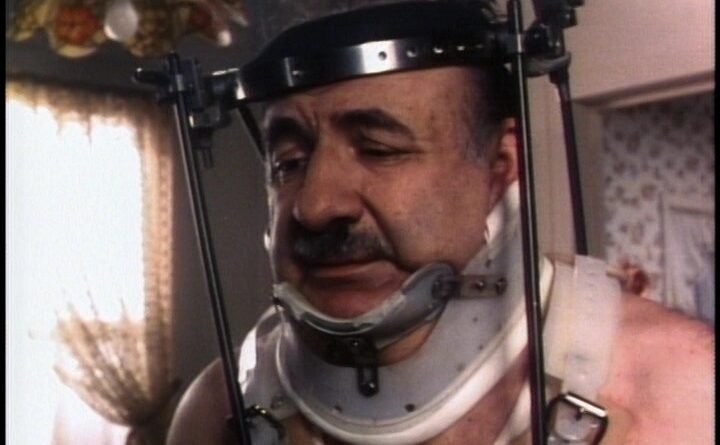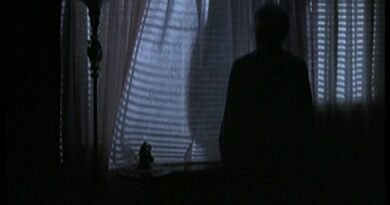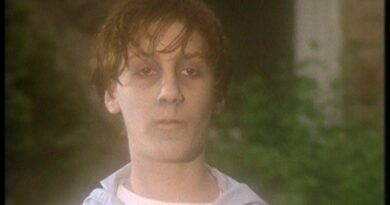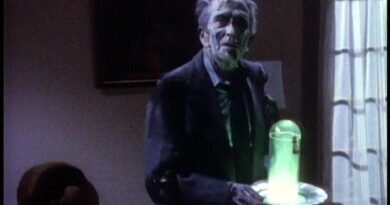Tales from the Darkside: “Pain Killer” (S1E03)

In its third episode, Tales from the Darkside takes a sharp left turn into surreal satire with “Pain Killer,” a darkly comedic story about chronic pain, marital discord, and one very unusual insurance agent. Less horror than Kafkaesque fever dream, this episode strays into absurdist territory, bringing an offbeat, almost stage-play-like vibe to the series. It doesn’t quite hit the emotional or thematic depth of earlier entries, but it’s strange, snappy, and unsettling enough to leave a mark. Let’s break it down.
Plot Summary
The story follows Harvey Turman, a middle-aged man suffering from unrelenting back pain. His agony is more than just physical; it bleeds into his domestic life, particularly his tense relationship with his overbearing wife, Nadine. Nadine doesn’t believe Harvey’s pain is real and constantly berates him to get back to work and stop whining. The household is a toxic stew of frustration, resentment, and barely concealed hostility.
Enter Mr. Caroll, a soft-spoken and mysterious man who introduces himself as an insurance representative. But instead of selling Harvey a policy, he offers him a miraculous solution: total, permanent relief from his pain. The cost? Not financial, but rather spiritual and personal, as the cure requires Harvey to embrace a sinister plan that includes… getting rid of Nadine.
As Mr. Caroll’s influence grows, Harvey becomes more confident, mobile, and sinister. His pain is gone, and he finally starts standing up to his wife—literally and figuratively. The episode ends ambiguously but with a clear implication: Harvey has accepted Mr. Caroll’s offer, and the price, while not spelt out, is ominously final.
What Works
A Clever Concept with Satirical Bite
The episode plays like a black comedy, skewering both the healthcare system and the suburban fantasy of problem-solving via shortcuts. Harvey’s pain is never taken seriously by his wife or his doctors, and it’s only when a strange outsider arrives with a surreal offer that he finally finds relief. The idea that pain can be cured by eliminating its source—in this case, Nadine—is both horrifying and hilarious.
Performances Full of Nuance and Camp
Harvey (played by Lou Jacobi) is a sympathetic figure, even when he starts slipping into the morally grey. His suffering feels genuine, and his arc from meek victim to vengeful plotter is compelling. Mr. Caroll, portrayed with eerie calm by Farley Granger, is a standout. He plays the part like a supernatural used car salesman, offering a deal that’s too good to be true, but with just enough menace to suggest he knows how it all ends.
Surreal, Stage-Like Atmosphere
There’s a claustrophobic, dreamlike quality to the episode that makes it feel more like a theatrical production than a TV show. The minimal sets and tight focus on dialogue enhance the feeling that the story is taking place in some off-kilter reality. This aesthetic choice reinforces the psychological nature of Harvey’s suffering and makes Mr. Caroll’s appearance even more otherworldly.
Ambiguity That Works
Unlike other episodes that sometimes leave things vague in frustrating ways, “Pain Killer” embraces its ambiguity in a satisfying fashion. You don’t need to know exactly who Mr. Caroll is (Death? A demon? Just a metaphor for personal empowerment gone wrong?) to enjoy the unsettling implications of Harvey’s choice.
What Doesn’t Work
Weak Characterisation of Nadine
The biggest flaw in this episode is the one-dimensional portrayal of Nadine. She’s written as shrill, unsympathetic, and emotionally abusive, which makes it far too easy to side with Harvey. A more complex or conflicted version of her character would have added layers to the story. As it stands, Nadine feels more like a caricature than a person, which undermines some of the moral tension.
Not Exactly Scary
As with the previous episode, “Pain Killer” leans more into dark humour than true horror. There are no scares, no suspenseful moments, and no supernatural spectacle. While the themes are grim, the presentation is light, bordering on comedic. That may disappoint viewers looking for something more traditionally spooky.
Pacing Issues in the Middle
The story is told in a very linear fashion, with long stretches of dialogue between Harvey and Mr. Caroll or Harvey and Nadine. While the performances are good, the pacing lags in the middle third. A bit more variety in scene or tension-building could have helped maintain momentum.
Themes: Pain, Empowerment, and the Price of Relief
At its core, “Pain Killer” is about desperation and the lengths people will go to escape suffering. Harvey is dismissed, diminished, and ignored by those around him, so when someone finally listens and offers help, it’s no surprise he takes it—even if the cost is moral corruption. The episode also plays with the idea of control: who controls your body, your pain, and your choices? And what happens when you reclaim that control through destructive means?
Final Thoughts: A Quirky, Morbid Allegory with Teeth
“Pain Killer” is one of the more unique early episodes of Tales from the Darkside, not because of traditional horror tropes, but because of its unsettlingly relatable premise and surreal execution. While it might not chill your bones, it will definitely make you squirm—and maybe even laugh. Its biggest strength is in its ambiguity, and its biggest weakness is its lack of character depth. Still, it’s a memorable dose of twisted moral storytelling.
Who Would Enjoy This Episode?
- Fans of dark comedy and surreal satire – The humour is dry and the horror is conceptual.
- Viewers interested in psychological horror – The terror here is in the implication, not the imagery.
- Anyone who appreciates minimalist, stage-style storytelling – The episode feels like a one-act play.
Who Might Not Enjoy It?
- Those looking for traditional horror scares – No ghosts or gore here.
- Viewers who want dynamic pacing – The dialogue-heavy structure may drag for some.
- Anyone expecting character nuance from the whole cast – Nadine’s flat characterisation is a sore spot.
Final Verdict: Strange Medicine with a Bitter Aftertaste
“Pain Killer” offers a smart, unsettling commentary on suffering and control, wrapped in the guise of a domestic drama gone wrong. It’s not terrifying, but it is thoughtful and disturbing in its own quirky way—a reminder that sometimes the cure is worse than the disease.




